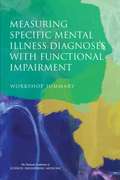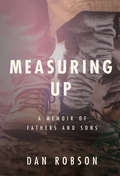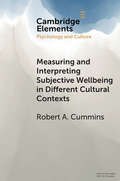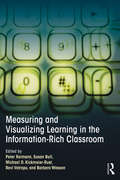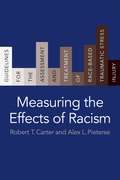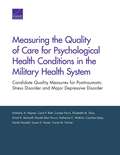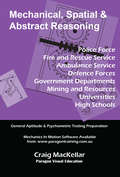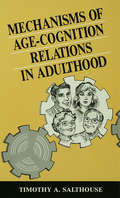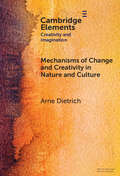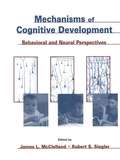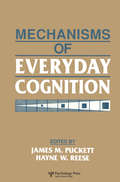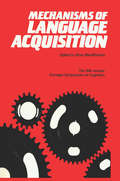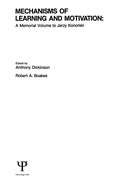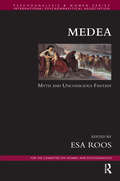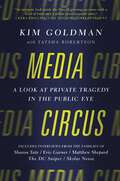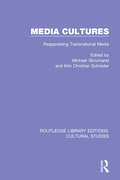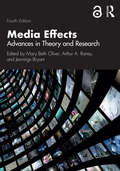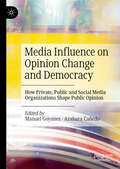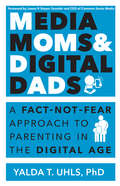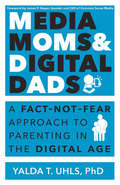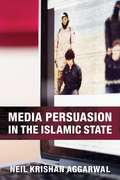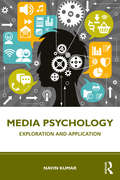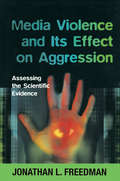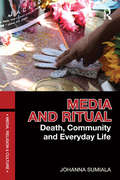- Table View
- List View
Measuring Specific Mental Illness Diagnoses with Functional Impairment: Workshop Summary
by Engineering Medicine National Academies of SciencesThe workshop summarized in this report was organized as part of a study sponsored by the Substance Abuse and Mental Health Services Administration (SAMHSA) and the Office of the Assistant Secretary for Planning and Evaluation of the U.S. Department of Health and Human Services, with the goal of assisting SAMHSA in its responsibilities of expanding the collection of behavioral health data in several areas. The workshop brought together experts in mental health, psychiatric epidemiology and survey methods to facilitate discussion of the most suitable measures and mechanisms for producing estimates of specific mental illness diagnoses with functional impairment. The report discusses existing measures and data on mental disorders and functional impairment, challenges associated with collecting these data in large-scale population-based studies, as well as study design and estimation options.
Measuring Up: A Memoir of Fathers and Sons
by Dan Robson&“Dan Robson&’s book is a heart-wrenching portrait of grief. Anyone who has lost a parent will recognize it, know it intimately as you roll through the stages and finally come to the realization that a parent&’s ultimate gift to a child is showing them how to live.&”—Tanya Talaga, bestselling author of Seven Fallen Feathers A tender memoir of fathers and sons, love and loss, and learning to fill boots a size too big. Dan Robson&’s father is a builder, a fixer. A man whose high-school education is enough not only to provide for his family, but to build a successful business. Rick Robson holds things up. When he dies, nothing in his son&’s world feels steady anymore. In a very real sense, the home his father had built is suddenly fragile. Without its natural caretaker, the house will fall to pieces—and his family shows all the same signs of crumbling. Dan is hit especially hard. He knows he is not the man his father was. Dan never learned the blue-collar skills he admired, because his father wanted him to pursue his dream of becoming a writer. Now that his father is gone, the acknowledgment of his sacrifices and the sheer longing to be close to him again in some way draw Dan to the tools that lie unused in the garage. So begins Dan&’s year of learning the skills his father&’s hands had long mastered, and trying to fill the steel-toe boots left behind. Measuring Up is the story of that journey. Robson picks up where his father left off, working on the house and the truck, as much for the family as for himself. In much the same way that Michael Pollan comes to know his house inside-out in A Place of My Own, Robson learns the mysteries and proud satisfaction of plumbing, carpentry, wiring, and drywalling, and comes to understand how our homes are built. He also comes to see how his home was built by his father, uncovering more than one heartbreaking reminder of the kind of man his father was, and what he meant to his family. Tender and unflinching, Measuring Up is a story of love, mourning, and what it means to use your calloused hands to make the world around you a better place to live.
Measuring and Interpreting Subjective Wellbeing in Different Cultural Contexts: A Review and Way Forward (Elements in Psychology and Culture)
by Robert A. CumminsThe scientific study of 'wellbeing' involves both objective and subjective variables. While objective wellbeing can be simply measured as tangible aspects of the living environment, measuring subjective wellbeing involves quantifying self-reported feelings. Although reliable and valid measures can be achieved, in a cross-cultural context differences in language and culture present formidable challenges to measurement comparability. This Element begins by describing the behaviour of subjective wellbeing in single cultures, using the theory of homeostasis. Robert A. Cummins then discusses cross-cultural differences in subjective wellbeing, with a focus on measurement invariance as a means of ensuring the validity of comparative results. Cummins proposes that the major barrier to creating such comparability of measurement is a pervasive response bias that differs between cultures. He concludes that current instruments are inadequate to provide valid cross-cultural measures of subjective wellbeing, and that suitable measures may be created as short forms of current scales.
Measuring and Visualizing Learning in the Information-Rich Classroom
by Peter Reimann Barbara Wasson Michael Kickmeier-Rust Ravi Vatrapu Susan BullIntegrated information systems are increasingly used in schools, and the advent of the technology-rich classroom requires a new degree of ongoing classroom assessment. Able to track web searches, resources used, task completion time, and a variety of other classroom behaviors, technology-rich classrooms offer a wealth of potential information about teaching and learning. This information can be used to track student progress in languages, STEM, and in 21st Century skills, for instance. However, despite these changes, there has been little change in the kind of data made available to teachers, administrators, students, and parents. Measuring and Visualizing Learning in the Information-Rich Classroom collects research on the implementation of classroom assessment techniques in technology-enhanced learning environments. Building on research conducted by a multinational and multidisciplinary team of learning technology experts, and specialists from around the globe, this book addresses these discrepancies. With contributions from major researchers in education technology, testing and assessment, and education psychology, this book contributes to a holistic approach for building the information infrastructure of the 21st Century school.
Measuring the Effects of Racism: Guidelines for the Assessment and Treatment of Race-Based Traumatic Stress Injury
by Robert T. Carter Alex L. PieterseA large body of research has established a causal relationship between experiences of racial discrimination and adverse effects on mental and physical health. In Measuring the Effects of Racism, Robert T. Carter and Alex L. Pieterse offer a manual for mental health professionals on how to understand, assess, and treat the effects of racism as a psychological injury.Carter and Pieterse provide guidance on how to recognize the psychological effects of racism and racial discrimination. They propose an approach to understanding racism that connects particular experiences and incidents with a person’s individual psychological and emotional response. They detail how to evaluate the specific effects of race-based encounters that produce psychological distress and possibly impairment or trauma. Carter and Pieterse outline therapeutic interventions for use with individuals and groups who have experienced racial trauma, and they draw attention to the importance of racial awareness for practitioners. The book features a racial-trauma assessment toolkit, including a race-based traumatic-stress symptoms scale and interview schedule. Useful for both scholars and practitioners, including social workers, educators, and counselors, Measuring the Effects of Racism offers a new framework of race-based traumatic stress that helps legitimize psychological reactions to experiences of racism.
Measuring the Mosaic
by Rick Helmes-HayesMeasuring the Mosaic is a comprehensive intellectual biography of John Porter (1921-1979), author of The Vertical Mosaic (1965), preeminent Canadian sociologist of his time, and one of Canada's most celebrated scholars. In the first biography of this important figure, Rick Helmes-Hayes provides a detailed account of Porter's life and an in-depth assessment of his extensive writings on class, power, educational opportunity, social mobility, and democracy.While assessing Porter's place in the historical development of Canadian social science, Helmes-Hayes also examines the economic, social, political and scholarly circumstances - including the Depression, World War II, post-war reconstruction, the baby boom, and the growth of universities - that contoured Porter's political and academic views. Using extensive archival research, correspondence, and over fifty original interviews with family, colleagues, and friends, Measuring the Mosaic stresses Porter's remarkable contributions as a scholar, academic statesman, senior administrator at Carleton University, and engaged, practical public intellectual.
Measuring the Quality of Care for Psychological Health Conditions in the Military Health System: Candidate Quality Measures for Posttraumatic Stress Disorder and Major Depressive Disorder
by Elizabeth M. Sloss Susan D. Hosek Katherine E. Watkins Coreen Farris Harold Alan Pincus Carrie M. Farmer Caroline Epley Kimberly A. Hepner Carol P. Roth Grant R. Martsolf Daniel MandelTo inform improvements to the quality of care delivered by the military health system for posttraumatic stress disorder and major depressive disorder, researchers developed a framework and identified, developed, and described a candidate set of measures for monitoring, assessing, and improving the quality of care. This document describes their research approach and the measure sets that they identified.
Mechanical, Spatial & Abstract Reasoning
by Craig MackellarThis text provides an overview of key principles relating to mechanical, spatial and abstract thought. The aim is to facilitate the following learning outcomes. + Identify individual elements within a group of elements; + Identify a rule connecting a set of figures; + Complete a number of test questions by applying a rule connecting a set of figures; + Apply techniques aimed at increasing the speed at which logical rules are generated (the faster a person generates solutions, the higher the probability of a correct answer--in a given period of time); + Increase the number of elements a person can keep track of in responding to an item (span capacity). Someone with a larger span capacity than someone else can take into account more figures without making errors and hence has a larger probability of a correct answer. Mechanical, Spatial and Abstract Reasoning ability is a key element in identifying aspects of person's general intelligence. That is why the vast majority of psychometric tests will have a component that relates to abstract and spatial reasoning. This ebook will provide a measure of eductive ability or fluid intelligence which is relatively independent of specific learning acquired in a particular cultural or educational context.
Mechanisms of Age-cognition Relations in Adulthood (Distinguished Lecture Series)
by Timothy A. SalthouseThis monograph is the written version of a series of talks delivered as recent MacEachran Lectures at the University of Alberta. The informal style of the lectures, and the inclusion of a relatively large number of figures, has been preserved in order to keep the monograph faithful to the concept of an individual attempting to integrate his own research into a reasonably coherent framework. Although the volume is very much a personal account of one individual's perspective, the studies reported are naturally a product of many collaborations as well as inspirations from colleagues. The fundamental issue addressed is how adult age differences in fluid or process aspects of cognitive functioning are to be explained. Several potential mediators are considered, with most of the emphasis devoted to the investigation of working memory and processing speed as variables mediating relations between age and cognition.
Mechanisms of Change and Creativity in Nature and Culture (Elements in Creativity and Imagination)
by Arne DietrichThis Element is about change. Specifically, it's about the underlying mechanisms that cause change to happen, both in nature and in culture; what types there are, how they work, where they can be found, and when they come into play. The ultimate aim is to shed light on two barbed issues. First, what kind of system of change is culture and, second, what kind of change in that system counts as creativity; that is, what are the properties of the mechanisms of change when we explore unknown regions of the cultural realm. To that end, a novel theoretical framework is proposed that is based on the concept of a sightedness continuum. A sightedness framework for the mechanisms of change can integrate the three mechanisms causing gradual, adaptive, and cumulative change – evolution, learning, and development – into a single dimension and provide a clear view of how they cause change.
Mechanisms of Cognitive Development: Behavioral and Neural Perspectives (Carnegie Mellon Symposia on Cognition Series)
by Robert S. Siegler James L. McClellandThis volume considers how children's thinking evolves during development, with a focus on the role of experience in causing change. It brings together cutting-edge research by leaders in the psychology and neurobiology of child development to examine the processes by which children learn and those that make children ready and able to learn at particular points in development. Behavioral approaches include research on the "microgenesis" of cognitive change over short time periods (e.g., several hour-long sessions) in specific task situations. Research on cognitive change over longer time scales (months and years) is also presented, as well as research that uses computational modeling and dynamical systems approaches to understand learning and development. Neural approaches include the study of how neuronal activity and connectivity change during acquisition of cognitive skills in children and adults. Other investigations consider the possible emergence of cognitive abilities through the maturation of brain structures and the effects of experience on the organization of functions in the brain. Developmental anomalies, such as autism and attention deficit disorder are also examined as windows on normal development. Four questions drive the volume: *Why do cognitive abilities emerge when they do during development? *What are the sources of developmental and individual differences, and of developmental anomalies in learning? *What happens in the brain when people learn? *How can experiences be ordered and timed to optimize learning? The answers to these questions have strong implications for how we educate children and remediate deficits that have impeded the development of thinking abilities. These implications are explored in several chapters in the volume, as well as in the commentaries by leading discussants.
Mechanisms of Everyday Cognition
by Hayne W. Reese James M. PuckettBased on the proceedings of the twelfth biennial conference on life-span developmental psychology, most of the contributions in this volume deal with the mechanisms of everyday cognition. However, a broad spectrum of additional concerns is addressed within the domain of everyday cognition: its metatheoretical underpinnings, theory and theoretical issues, methods of investigation, empirical considerations, and social issues and applications. Addressing everyday cognition in infancy, childhood, adolescence, young and middle adulthood, and old age, this book is consistent with the chronological life-span theme of this series. The contributors collectively discuss some of the traditional concerns of life-span psychology: the dialectical nature of everyday cognition, individual differences, and contextual influences. Leading and concluding chapters provide overview, integration, and summary. In bringing together a wide array of age periods and points of view within the domain of everyday cognition, the editors hope that students and researchers in developmental psychology and cognitive science will find a useful cross-fertilization of ideas. A huge variety of theoretical perspectives is presented ranging from the position that everyday cognition and academic (laboratory) cognition are different manifestations of the same underlying processes to the position that the underlying processes are completely separate. Also of importance, a large assortment of research methods is illustrated including interviews, laboratory simulations, real-life observations and psychometric methods.
Mechanisms of Language Acquisition: The 20th Annual Carnegie Mellon Symposium on Cognition (Carnegie Mellon Symposia on Cognition Series)
by Brian MacWhinneyFirst published in 1987. Three decades of intensive study of language development have led to an enormous accumulation of descriptive data. But there is still no over-arching theory of language development that can make orderly sense of this huge stockpile of observations. Grand structuralist theories such as those of Chomsky, Jakobson, and Piaget have kept researchers asking the right questions, but they seldom allow us to make detailed experimental predictions or to formulate detailed accounts. The papers collected in this volume attempt to address this gap between data and theory by formulating a series of mechanistic accounts of the acquisition of language.
Mechanisms of Learning and Motivation: A Memorial Volume To Jerzy Konorski
by Anthony Dickinson Robert A. BoakesThis volume consists of a series of chapters honoring a Polish psychologist and neurophysiologist who died in 1973. Although his name was familiar to all of the contributors, many had had no personal contact with him and had gained acquaintance with his ideas only through his publications.
Medea: Myth and Unconscious Fantasy (Psychoanalysis and Women Series)
by Esa RoosThis book takes Euripides tragedy of Medea as its starting point. Our unconscious fantasies can be embedded in age-old myths, and many modern works about Medea reflect our ever-present interest in such myths. The Danish film director T.H. Dreyer had plans to produce a film about the story of Medea, while his countryman Lars von Trier did in fact make his own version of Medea, based on Dreyer`s previous work on the theme. In this remarkable new book the `Medea fantasy is introduced as an unconscious determinant of psychogenic sterility, a fantasy that may form an unrecognized and dissociated part of the self-representation. The book describes how this can lead women to believe that their lovers (like Jason in the original myth) will deceive and abandon them, and that this anxiety might cause them to react violently towards their children. For such women it is imperative to forgo any creative femininity.
Media Circus: A Look at Private Tragedy in the Public Eye
by Kim Goldman Tatsha RobertsonImagine losing a loved one in the public eye. A media frenzy ensues and spreads your family name through the news. Reporters ambush you, and across the country, strangers gossip about your personal loss. Welcome to the circus. No one understands better than Kim Goldman the complex emotions of individuals suffering a personal tragedy under the relentless gaze of the media. During the famed O.J. Simpson trial, Kim, whose brother, Ron Goldman, was brutally murdered, became the public poster child for victims suffering in the public eye. In Media Circus, Goldman, now a dedicated victims' advocate who works with families across the country, presents the first collective look at these ordinary, grieving victims—forced to manage their very private trauma and despair in a very public way. Through candid interviews and detailed, original reporting, Media Circus delivers riveting, humanizing, and inspiring stories from the victims and survivors of violent crimes who found themselves the focus of national media attention. Its heartfelt narratives showcase the unique challenges of coping with and healing from grief when the whole world is watching. In these pages, the families of other victims tell their stories, including: Esaw And Emerald Garner, wife and daughter of police brutality victim Eric Garner (2014) Scarlett Lewis, mother of six-year-old Newtown tragedy victim Jesse Lewis (2012) Debra Tate, sister of Charles Manson murder victim Sharon Tate (1969) Judy Shepard, mother of gay hate-crime victim Matthew Shepard (1998) Mildred Muhammad, ex-wife of the DC Sniper (2002) Tere Duperrault Fassbender, survivor of family's brutal murder at sea (1961) Collene Campbell, sister of murdered NASCAR driver Mickey Thompson (1988) Marie Monville, wife of the Amish Shooter (2006) Dave And Mary Neese, parents of teen murder victim Skylar Neese (2012) Scott And Kathleen Larimer, parents of Aurora theater shooting victim John Larimer, and Shirley Wygal, mother of Aurora theater shooting victim Rebecca Wingo (2012) Media Circus goes beyond the names and faces to show the real victims behind the stories.
Media Cultures: Reappraising Transnational Media (Routledge Library Editions: Cultural Studies)
by Michael Skovmand Kim Christian SchrøderThis book, first published in 1992, challenges the elitism and cultural pessimism of much Anglo-American and Continental cultural debate with regard to the role and power of transnational media practices. In a series of ten innovative essays, an international group of media researchers explores a wide range of cultural practices across national borders and the cultural politics associated with these everyday practices and debates.
Media Effects: Advances in Theory and Research (Routledge Communication Series)
by Jennings Bryant Mary Beth Oliver Arthur A. RaneyNow in its fourth edition, Media Effects again features essays from some of the finest scholars in the field and serves as a comprehensive reference volume for scholars, teachers, and students. This edition contains both new and updated content that reflects our media-saturated environments, including chapters on social media, video games, mobile communication, and virtual technologies. In recognition of the multitude of research trajectories within media effects, this edition also includes new chapters on narratives, positive media, the self and identity, media selection, and cross-cultural media effects. As scholarship in media effects continues to evolve and expand, Media Effects serves as a benchmark of theory and research for the current and future generations of scholars. The book is ideal for scholars and for undergraduate and graduate courses in media effects, media psychology, media theory, psychology, sociology, political science, and related disciplines.
Media Influence on Opinion Change and Democracy: How Private, Public and Social Media Organizations Shape Public Opinion
by Manuel Goyanes Azahara CañedoThis book reviews and advances the theoretical and empirical knowledge at the intersection of opinion change and democracy. Specifically, the volume addresses how opinion change and political persuasion unfold in three main domains of media effects: private media (i.e., news organizations), public service media (state-own media services), and social media platforms. Divided in these three different sections, the volume serves as a venue to discuss and further advance the most recent theoretical assumptions and empirical findings that underpin our current understanding on how media influence public opinion and shape liberal democracies. The book also explores how media literacy and critical thinking can mitigate the effects of misinformation and propaganda, emphasizing the importance of educating the public to discern credible information from deceptive content. Furthermore, it discusses the ethical implications of media practices and the responsibilities of media producers in maintaining the integrity of democratic discourse. By highlighting these aspects, the book provides a comprehensive understanding of the complex interplay between media, public opinion, and democracy, offering valuable insights for scholars, policymakers, and anyone interested in the role of media in shaping public opinion.
Media Moms & Digital Dads: A Fact-Not-Fear Approach to Parenting in the Digital Age
by Yalda T UhlsIs social media ruining our kids? How much Internet activity is too much? What do FOMO (Fear of Missing Out), sexting, and selfies mean for teens? Are you curious about what research says about how media and technology are affecting childhood? Supported by academic research focused on technology, Media Moms & Digital Dads breaks down complex issues in a friendly, accessible fashion, making it a highly useful and, ultimately, reassuring read for anyone who worries about the impact that media might be having on young minds. Each chapter delves into a different issue related to kids and media so parents can easily find their particular issue of concern. Dr. Uhls ends each chapter with quick takeaways, in the form of tips and guidance for parents. Dr. Uhls' expertise as a former Hollywood film executive and as a current expert on child development and the media gives her a unique and important perspective. As a trained scientist she understands the myriad studies conducted by researchers, and as a mom of digital teens, she knows what actually works and can relate to the reality of being a parent in the 21st century. Dr. Uhls also describes the primary research she conducted at UCLA, including whether extensive screen time impacts non-verbal emotional understanding, which has been covered in the New York Times, Time magazine, and on National Public Radio. There are few more important issues for parents today than helping children safely navigate the digital world in which we live, a world that provides immense opportunity for learning and connecting yet also puts kids in a position to make mistakes and even cause harm. Knowing what the facts are and when and how to get involved is perhaps one of the most challenging aspects of modern parenting. Media Moms & Digital Dads offers parents reassuring and fact-based guidance on how best to manage screens and media for their children.
Media Moms and Digital Dads: A Fact Not Fear Approach to Parenting in the Digital Age
by Yalda T. UhlsA new media was unleashed upon the world and children took to it like ducks to water. Young people everywhere devoured its content, spending hours upon end immersed in it, while simultaneously ignoring the adults in their lives. Parents were understandably alarmed and worried that this new media was ruining young minds. It may surprise you to know that this new media was not the Internet, radio, or television but rather the 19th-century novel. Yes, parents were concerned that reading too much Jane Austin was going to ruin their children. Fast-forward to today and we are still having the same conversation. Will digital media, in its various forms, ruin our children? In Media Moms & Digital Dads, former film producer turned child psychologist Yalda Uhls cautions parents not to be afraid of the changing state of media but to deal with the realities of how our kids engage with it. The truth is children today spend more time with media than they do with parents or in schools. And as parents, many of us did not have early exposure to the Internet, mobile phones, and gaming, making the world of our children somewhat foreign to us. The key, says Uhls, is to understand the pros and cons of media so that parents can make informed decisions about cause and effect, boundaries and exposure. Uhls debunks the myths around media by delving into the extensive body of social science research, proving that our kids are all right, and that parents can and must adapt to help their children thrive in the digital age. This ground-breaking book will draw back the curtain and reveal the truth-often surprising and counterintuitive, and other times reassuring-in order to help guide the conversation about our digital age and the future of childhood.
Media Persuasion in the Islamic State
by Neil Krishan AggarwalSince the declaration of the War on Terror in 2001, militant groups such as al-Qaeda and the Islamic State have used the internet to disseminate their message and persuade people to commit violence. While many books have studied their operational strategies and battlefield tactics, Media Persuasion in the Islamic State is the first to analyze the culture and psychology of militant persuasion.Drawing upon decades of research in cultural psychiatry, cultural psychology, and psychiatric anthropology, Neil Krishan Aggarwal investigates how the Islamic State has convinced people to engage in violence since its founding in 2003. Through analysis of hundreds of articles, speeches, videos, songs, and bureaucratic documents in English and Arabic, the book traces how the jihadist Abu Musab al-Zarqawi created a new culture and psychology, one that would pit Sunni Muslims against all others after the U.S.-led invasion of Iraq. Aggarwal tracks how Osama bin Laden and al-Zarqawi disagreed over the goal of militancy in jihad before reaching a détente in 2004 and how al-Qaeda in Iraq merged with five other groups to diffuse its militant cultural identity in 2006 before taking advantage of the Syrian civil war to emerge as the Islamic State. Aggarwal offers a definitive analysis of how culture is created, debated, and disseminated within militant organizations like the Islamic State. Psychiatrists, psychologists, and area-studies experts will find a comprehensive, systematic method for analyzing culture and psychology so they can partner with political scientists, policy makers, and counterterrorism experts in crafting counter-messaging strategies against militants.
Media Psychology: Exploration and Application
by Navin KumarThis book examines media psychology as a field of study and provides a fundamental understanding of its emergence and application. It covers various key themes such as consumer behavior, mass media and advertising, media and culture, media messages and their effects on individual and group behavior in the Indian context. It highlights the role of media psychology with reference to citizenship and pedagogy and studies the emerging concept of digital altruism. The author also discusses various research methods used in this field that help to objectively evaluate the impact of mass media messages on people and people’s effect on the functioning of mass media. This comprehensive book will be useful to students and researchers of psychology, media psychology, mass-communication, consumer behavior, digital marketing, corporate communication, and media studies.
Media Violence and its Effect on Aggression
by Jonathan L. FreedmanThe scientific evidence does not support the notion that TV and film violence cause aggression in children or in anyone else. So argues Jonathan Freedman, based on his findings that far fewer than half of the scientific studies have found a causal connection between exposure to media violence and aggression or crime. In fact, Freedman believes that, taken to a more controversial extreme, the research could be interpreted as showing that there is no causal effect of media violence at all.Media Violence and its Effect on Aggression offers a provocative challenge to the accepted norms in media studies and psychology. Freedman begins with a comprehensive review of all the research on the effect of violent movies and television on aggression and crime. Having shown the lack of scientific support for the prevailing belief that media violence is connected to violent behaviour, he then explains why something that seems so intuitive and even obvious might be incorrect and goes on to provide plausible reasons why media violence might not have bad effects on children. He contrasts the supposed effects of TV violence on crime with the known effects of poverty and other social factors, and discusses the difference between television advertising, which, he argues, does have an effect, and violent programs, which do not. Freedman concludes by noting that in recent years television and films have been as violent as ever and violent video games have become more and more popular, yet during this period there has been a dramatic decrease in violent crime. He argues that this makes it highly implausible that media violence causes aggression or crime.
Media and Ritual: Death, Community and Everyday Life (Media, Religion and Culture)
by Johanna SumialaThis wide-ranging and accessible book offers a stimulating introduction to the field of media anthropology and the study of religious ritual. Johanna Sumiala explores the interweaving of rituals, communication and community. She uses the tools of anthropological enquiry to examine a variety of media events, including the death of Michael Jackson, a royal wedding and the transgressive actions which took place in Abu Ghraib, and to understand the inner significance of the media coverage of such events. The book deals with theories of ritual, media as ritual including reception, production and representation, and rituals of death in the media. It will be invaluable to students and scholars alike across media, religion and anthropology.
